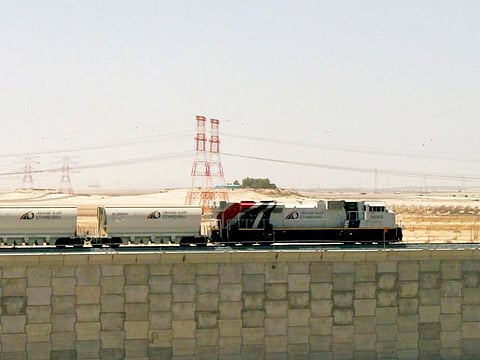Etihad Rail completes freight terminal connection at ICAD with main line
Freight terminal at ICAD Abu Dhabi connected with main line

Abu Dhabi: Etihad Rail has successful completed the connection between the railway freight terminal at the Industrial City of Abu Dhabi (ICAD), the developer of UAE’s national rail network said on Friday . The Company completed tracklaying works and conducting successful tests on the new line, which extends from the borders of Saudi Arabia to the port of Fujairah, on the eastern coast, passing through key manufacturing hubs and urban centres.
Upon the completion of Stage Two of the UAE National Rail Network, Etihad Rail will provide logistics solutions from the railway terminal, which is located at the heart of the Industrial City of Abu Dhabi.
“This achievement, which supports our efforts to encourage companies to restructure their logistical operations and opt for rail logistics solutions, thereby cutting costs, increasing efficiency, and providing safer transportation of goods,” said Mohammed Al Marzouqi, Executive Director of Rail Relations Sector at Etihad Rail. “This is exemplified by the trade agreements that we have made with some of the biggest companies in the UAE, such as Stevin Rock, Western Bainoona Group, and Al Ghurair Iron & Steel.”
“Our network will have a positive impact on end users, as it will contribute to reducing trucks on roads and bring down their maintenance costs. It will further drive the sustainable development that we are witnessing across the UAE, by enabling a positive socioeconomic impact on industry, commerce, the environment, and more,” he added.
Largest inland railway freight terminal
Etihad Rail is constructing the largest inland railway freight terminal in the UAE in ICAD, spanning just over 2.7 million square feet, the new railway freight terminal at will comprise over 22 buildings and major structures to support operations, processing up to nine trains each day.
It will facilitate the distribution of goods across the countries of Gulf Cooperation Council (GCC) and UAE, where it will connect quarries in the northern emirates to industrial centres in the Musaffah area, in addition to connecting Ruwais, Khalifa Port and the container companies in Dubai within Jebel Ali Port. The containers will be hauled by rail to and from other freight facilities following a road journey to the end-user location.
The railway freight terminal will act as a logistics hub for heavy industries enabling a seamless distribution of raw materials and machinery for manufacturers, in addition to facilitating better connections to vital trade infrastructure, such as ports. It will also offer customs services. When fully operational, the ICAD railway freight terminal will process over 15 million tonnes of loose raw materials, 1.5 tonnes of general cargo, and around 116,600 20-foot shipping containers annually.



